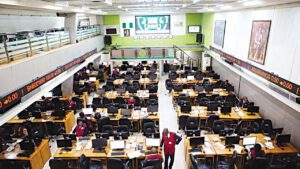

Analyst predicts $288.8m expansion in Nigeria’s data centre market
By Esther Agbo
Nigeria’s data centre market is anticipated to expand significantly, growing from $131.6 million to $288.8 million by 2027.
According to the Enterprise Sales Director for Central Africa at Vertiv, Gbenga Adebowale, this forecast highlights a major recovery and adaptation within the sector post-pandemic.
Adebowale emphasised the expected rise in market value from $131.6 million in 2022 to $288.8 million by 2027, as noted in a statement on Tuesday pointing out that the COVID-19 pandemic accelerated the shift to remote and hybrid work models, which in turn increased demand for robust data infrastructure.
In his words, “With the market value expected to soar from $131.6 million in 2022 to $288.8 million by 2027, the country’s data infrastructure is undergoing a significant transformation to meet rising demands.”
He explained that this shift has placed unprecedented pressure on network infrastructures, necessitating scalable and robust data centre solutions.
“Constantly changing capacity demands, external market forces, and the ramping up of compute-intensive applications, such as AI and machine learning, have combined to exert unprecedented pressure on data centres and networks.
“To address these challenges, many Nigerian businesses are turning to prefabricated modular data centres. These solutions are gaining popularity for their rapid deployment, flexibility, and cost-effectiveness.
“Unlike traditional data centre builds, PFMs are factory-built, ensuring high reliability and repeatability. They can be deployed quickly, meeting urgent capacity needs without the delays associated with conventional construction methods.
“The benefits of PFMs are evident in their ability to scale. Organisations can add capacity incrementally, reducing energy use, costs, and carbon footprint.
“Additionally, these modular solutions can be customised to specific needs and are adaptable to various architectures, including high-density computing and liquid cooling,” Adebowale stated.
Colocation services, which make up more than half of Nigeria’s data centre market, are also driving growth, saying “These services provide businesses with enhanced security, convenience, and reduced power interruptions, making them an attractive option for companies looking to expand their digital footprint.
“The global colocation market mirrors this trend, with projections indicating growth at a 6.5 percent CAGR through 2027, reaching $136 billion by 2028.
“As Nigeria’s digital economy continues to expand, the demand for advanced data centre solutions is expected to rise. Prefabricated modular data centres offer a lifeline for businesses, enabling them to meet increasing capacity requirements efficiently and cost-effectively.
“This growth trajectory underscores the critical role of digital infrastructure in supporting the nation’s economic development and technological advancement.
“There is no question that for enterprise data centres looking to add compute, power, or cooling in smaller increments, modular solutions represent a lifeline that can mitigate urgent capacity demands and facilitate lasting growth. With the data centre market set to double, Nigeria is well-positioned to become a leading player in the African technology landscape.”
Adebowale concluded by emphasising the critical role of modular solutions for enterprise data centres in managing urgent capacity demands and facilitating lasting growth, positioning Nigeria to become a leading player in the African technology landscape.




